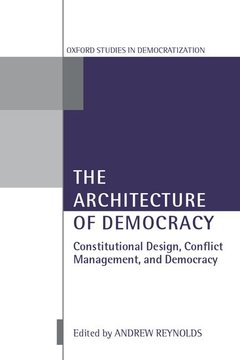Description
The Architecture of Democracy
Constitutional Design, Conflict Management, and Democracy
Oxford Studies in Democratization Series
Coordinator: Reynolds Andrew
Language: English
Subject for The Architecture of Democracy:
The architecture of democracy constitutional design, conflict management, and democracy
Publication date: 03-2002
532 p. · 15.7x23.3 cm · Paperback
Publication date: 03-2002
532 p. · 15.7x23.3 cm · Paperback
The architecture of democracy constitutional design, conflict management, and democracy
Publication date: 03-2002
530 p. · 16.3x24.1 cm · Hardback
Publication date: 03-2002
530 p. · 16.3x24.1 cm · Hardback
Description
/li>Contents
/li>Comment
/li>
Reynolds brings together the leading scholars to discuss the successes and failures of constitutional design. Arend Lijphart and Donald Horowitz debate their own contributions to the field. Emerging scholars then present important new evidence from Europe, the CIS, Latin America, and Africa. Chapters analyse the effect of presidential and parliamentary systems, issues of federalism and autonomy, and the varying impact of electoral systems. The book concludes with case studies of Fiji, Ireland, Eritrea, Indonesia, Nigeria, and India. The Architecture of Democracy is the culmination of the study of constitutional engineering in the third wave of democracy and sets parameters for this crucial research as democracy diffuses across the world.
Part. Part 1: Institutional Design in Divided Societies. An Overview, Katharine Belmont, Scott Mainwaring, and Andrew Reynolds: Introduction Institutional Design, Conflict Management, and Democracy in Divided Societies, 1: Donald L. Horowitz:. Constitutional Design and the Problem of adoption: Proposals versus Processes, 2: Arend Lijphart: The Wave of Power Sharing Democracy, 3: Olga Shvetsova: Institutions and Coalition-Building in Post-Communist Transitions, Part. Part 2: Presidentialism. Federalism and Decentralization, and Electoral Systems., 4: Timothy Frye: Presidents, Parliaments and Democracy: Insights from the Post-Communist World, 5: Jose Antonio Cheibub: Presidentialism and Democratic Performance, 6: Yash Ghai: Constitutional asymmetries: Communal Representation, Federalism, and Cultural Autonomy, 7: Steven L. Solnick: Federalism and State-Building: Post-Communist and Post-Colonial Perspectives, 8: Pippa Norris: Ballots not Bullets: Testing Consociational Theories of Ethnic Conflict, Electoral Systems and Democratization, 9: Rein Taagepera: Designing Electoral Rules and Waiting for an Electoral System to Evolve, Part. Part 3: Country Studies. 10: Brij. Part 5: Lal. Constitutional Engineering in Fiji, 11: Brendan O'Leary: The British-Irish Agreement of 1998: Results and Prospects, 12: Bereket Habte Selassie: The Eritrean Experience in Constitution Making: The Dialectic of Process and Substance, 13: R. William Liddle: Indonesia's Democratic Transition: Playing By the Rules, 14: Rotimi Subu and Larry Diamond: Institutional Design, Ethnic Conflict Management, and Democracy in Nigeria, 15: David Stuligross and Ashutosh Varshney: India
© 2024 LAVOISIER S.A.S.




